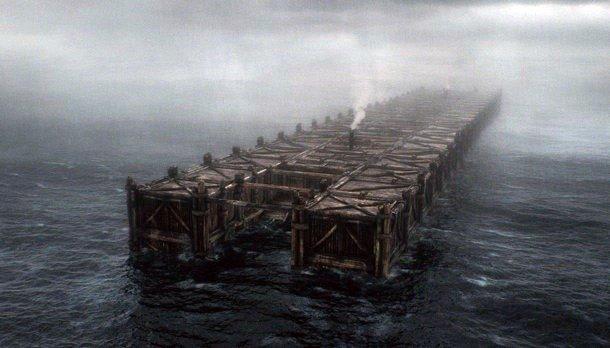
1. Noah continues director Darren Aronofsky’s streak of making films that I will never watch more than once.
2. (The film is new on DVD &c.; I dutifully missed in the theater).
3. (Although I did see Aronofsky’s first feature Pi in the theater—at my university’s student union. I liked the claustrophobic paranoia of Pi, but the film was also silly, histrionic even, and I did not understand the film’s handling of metaphysics—mostly because the film does not understand its own metaphysical vision).
4. (Noah, for its part, does understand its own metaphysical vision).

5. Aronofsky’s Noah takes place in a post-apocalyptic landscape: Cities are failing, the world is barren, dry, the ground seems to be comprised of basalt and ash. The people in his Prediluvian world use a mishmash of technologies, some of which seem fairly advanced (strip-mining, metallurgy, advanced textiles, etc.)—but these technologies also seem stymied, stuck, abortive last grasps at progress. Noah looks at times like a Mad Max film, or even Hillcoat’s adaptation of The Road.
6. Aronofsky’s Noah is a post-apocalyptic pre-apocalypse film.
7. Aronofsky’s Noah attempts an answer to both Adam and Eve’s expulsion from Eden and Cain’s murder of Abel.
8. Aronofsky’s Noah foregrounds the radical infanticide at the heart of the flood myth.
9. From A. Samuel Kimball’s The Infanticidal Logic of Evolution and Culture:
. . . when he promises never again to subject the world to such destruction, God memorializes the irreversibility of his massively -cidal violence and binds the future that will transpire to the futurity that will now never come to pass. Indeed, God destroys an infinite number of futures with the respective deaths of the Flood’s victims, for whom the waters of the Flood will never stop flooding, never cease obliterating the future. When he ratifies his promise in the covenant with Noah and his descendants, God inscribes the future reproductivity of the Noahic lineage in the limitless infanticidism of the Flood.
10. Aronofsky’s Noah gains most, if not all, of its moral tension in depicting Noah’s attempt to negate the future reproductivity of the Noahic lineage.
11. Should humanity be allowed to exist after The Flood? is Noah’s (and Noah’s) central question. Aronofsky’s answer to this question is, I think, ultimately ambiguous. While Noah’s own infanticidal violence (an extension of his attempt to prevent his sons from begetting offspring) is suspended (by love!), Aronofsky represents this suspension with ambivalence. Noah, drunk in a cave, invites us to look on his naked failure.
12. Aronofsky’s Noah is most successful as a kind of failed boilerplate color-by-numbers summer-popcorn-big-budget-action flick. It’s just too weird to fully adhere to its formula, but it hangs together by the formula nonetheless, jostling, uneasy.
13. Aronofsky’s Noah features giant fallen angels encased in rock. These golems are probably the signal special effect of the film, and a sore reminder of the pervasive influence of the special effects battle sequences in Peter Jackson’s Lord of the Rings.
14. This was easily my favorite sequence of Noah:
15. (And yet that sequence still suffers from a kind of queasy supernatural cheesiness that infects Aronofsky’s work).
16. After watching the film, I sought reviews, which led me quickly to John Nolte’s paranoid (and unintentionally hilarious) take on the film at the right-wing website Breitbart. Nolte clearly enjoyed the film and he repeatedly praises its techniques, production values, and acting, but condemns it as “blasphemous” in depicting God as “some kind of tree-hugger.” “Aronofsky is the anti-Michelangelo,” Nolte declares, “a master craftsman using his talents to a dishonest and wicked end.” That wicked end is “using the story of Noah to twist Christianity into something it is not…[Noah is] a genius piece of propagandizing that is sure to lead many away from God under the mistaken belief that through left-wing environmentalism they are coming closer to Him.”
Nolte’s strident praise/condemnation is hilarious and hyperbolic.
Does he actually believe that this movie is aesthetically affecting enough to motivate any kind of change in belief?
17. (Reviews like Nolte’s are important to me because they help to remind me of the subjectivity of aesthetic experience. He saw a completely different film (with his completely different eyes) than I did).
18. My favorite Aronofsky film, and the only one that I would consider watching again, is The Fountain. I think that The Fountain might be a kind of precursor film to Noah, a trial-run even, although I have no evidence for this claim.
19. I started this riff with the claim that I have no desire to rewatch Aronofsky’s films, and that Noah continues this pattern. Aronofksy is an auteur, and like most auteurs, I’m sure rewatching his films would enrich an understanding of the themes and problems he’s trying to address. However, I find his films repulsive, by which I mean the opposite of compelling. I have never wanted to exit a fictional world as much as I wanted to escape Requiem for a Dream. I found The Wrestler depressing and empty. I’m afraid if I watch Black Swan again it will turn out that Aronofsky was actually not attempting to make a comedy about psychosis, but was rather actually serious about his melodrama’s tragic scope.
20. Noah isn’t repulsive, but it isn’t great either. Flawed doesn’t even begin to describe the film—yes, it survives its own competing impulses of spectacle-bombast and introspective-character-study, but never synthesizes them. It’s unclear who the film is for. The film resolves in a moment of supposed-uplift, positing “love” –of offspring– as a solution, but it also binds that solution/blessing in the cursing of offspring.
Both of these moments feel wholly inauthentic. In the end, what remains is the bitter aftertaste of Noah’s contempt—and his anxiety at failing to create a utopia devoid of humans.
Tagged: bible movies, Darren Aronofsky, Film, Noah, Reviews, riffs